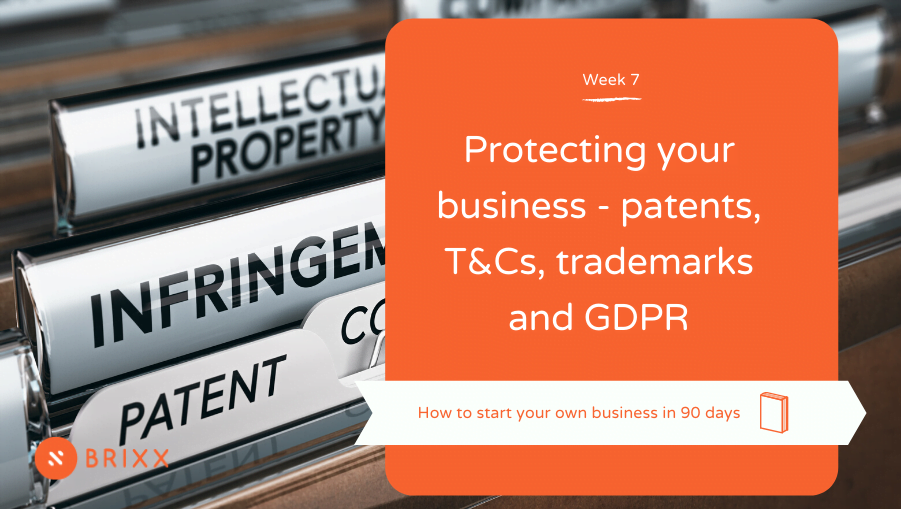Protecting your Business – Everything You Need to Know

In this article, we explore the ways you can protect your business.
You’ve got a minimum viable product and know how you’re going to market it.
You now need to make sure you protect your business from the law and to ensure people don’t steal your idea!
In this article you’ll learn:
- How to patent & trademark your intellectual property and designs.
- What terms & conditions and privacy policy are and what they must include
- How to protect your company from breaching GDPR
Patenting your idea is one of the first steps you should take to protect your business.
How to patent an idea
If you’ve come up with an innovative product that’s integral to your new business idea you can use a patent to protect your invention. It gives you the right to take legal action against anyone who makes, uses, sells or imports it without your permission. There are some conditions around what can be patented and what can’t, and you’ll need to be prepared for a potentially long, complicated and expensive patent application process.
It’s a good idea to get a professional advisor/patent lawyer to help you decide whether you should apply for a patent. Only about 1 in 20 patents are granted without the use of professional help, and seeking advice will help you decide whether it’s right to start what is often a time consuming process.
Other ways to protect your intellectual property
There are other ways that you can protect your business. For example, you can use:
- Trademarks – if you can create a brand and be the first to market.
- Design rights – if how your product looks (rather than how it works) is important and innovative.
- Non-disclosure agreements with any other parties involved in the design/manufacture or sale of your product.
How to trademark a name and trademark registration
A trademark can be any sign that identifies you as the owner of any goods or services. Names and logos are the most common things to be trademarked.
Your trademark needs to be unique – it can’t be similar to any other trademarks – particularly if you operate in the same sector. Without a trademark, you have almost no legal rights to protect your own logo/company/brand name. Without it, it would be entirely possible for another company to register it as a trademark, and stop you using your own brand name!
In the UK, The Intellectual Property Office is the government body that deals with trademark registrations. Most countries have their own system – and you’ll usually have to apply for a trademark in each country you want it to cover.
Contracts
Contracts are legally binding agreements between the parties involved and can protect both parties in the agreement. They are usually written, but can also be spoken or implied.
There are some general contracts that you should have in place to protect yourself:
- Partnership agreement – if you are starting or running a business with someone else, you must draw up a contract showing the split of ownership, salaries, decision making etc and what happens if one partner wants to leave, or you go out of business.
- Non-Disclosure Agreements (NDAs) and Confidentiality Agreements – when working with other people or companies, you may need to share sensitive information with them. In this case, all parties should sign a non-disclosure agreement, which will stop them sharing, selling or distributing this information with others.
- Contractor contracts – if you contract another company to carry out some work for your company, it is always a good idea to have a written contract between the 2 companies, defining the relationship.
As with any contract, it is advisable that you take legal advice to make sure that all contracts are set up clearly and with your best interests in mind.
Terms and Conditions
Ahh, T&Cs… the greatest source of lies on the planet. Why? Because everyone “agrees” to having read them, when they have done nothing of the sort!
But, though they’re often skim read at best, T&Cs are an important thing to get right in order to protect your business. In the new era of GDPR (we’ll talk about this further down!) T&Cs are meant to be clear and easy to understand, rather than walls of legalistic jargon. While clarity is important, so is the legal side.
A customer or user of your products and services who accept your terms and conditions is agreeing to a certain set of expectations about what you’ll each get out of the interaction between them and your company. This is a legally binding contract, protecting the rights of both the user/customer and also the company.
Terms and conditions can also allow you to suspend/ban customers from using your site/services if they contravene the T&Cs in any way. They can also set out the payment terms that are required, so can help with the cash-flow of the business.
The precise wording depends on the individual business but could include:
- A definition of the products or services provided
- Setting out any payment terms – when is a payment due?
- Any guarantees or warranties offered
- Timelines for delivery and any queries
- Specifying what happens if either party doesn’t deliver or pay or wants to end the relationship
- The term of the agreement and what notice is required to get out of it
- The law governing the contract
Obviously, given their importance, it’s good to have professional advice on your T&Cs.
Privacy Policy
It is a legal requirement to have a privacy policy if you have a website, blog or mobile app and collect personal data from the users of the website or your services. The document should lay out the type of data that you collect, how you collect it, where it is stored, how long it is stored for and whether it gets passed to any third parties. The use of website cookies should also be included within your privacy policy. Your privacy policy must be on your website, and be easy for people to find and view. Privacy policies can help build trust between you and your customer.
GDPR
You may also want to look at policies for equality, fairtrade, anti-slavery and social media policies as your company grows.
The General Data Protection Regulations came into effect in May 2018 and are designed to help protect personal information. All businesses that trade with customers in the EU (and the UK) must be compliant with these regulations. This applies to information kept on staff, customers and account holders, including staff records, customer mailing lists and even CCTV footage.
The gist of GDPR is that businesses should use common sense to protect people’s personal information and keep no more information than they need. If you collect or store any kind of information that could be used to identify a person, then this must be securely stored and recorded. If you have a data breach (someone hacks your website, or you leave a client file on the train) you can report exactly what has been taken to the ICO (Information Commissioner’s Office). Customers also have the ‘right to be forgotten’ – which means they can request that all information about themselves be removed from your systems. They can also request any information that you hold on them, which must generally be delivered within a month. If you’re building a business around aggregating a lot of customer information, make sure that you have mechanisms in place to remove, or share this information if requested.
For small businesses, you will need to register with the ICO and tell them the type of data that you collect and process. The rules apply whether you collect and store the data on a spreadsheet, in the cloud, on a mobile phone or paper files in the office, and applies to both staff and customer records.
Final Thoughts
The importance of protecting your business should never be undervalued. Ensuring you’ve all of the above in place will mean you won’t be hit with fines or find that your intellectual property has been stolen.
Try to get outside help where possible for all of these as loopholes are often found and exploited. You need to make sure everything is watertight!
If you’ve been following along with the blog posts this week you’ll now have an idea of the insurance you’re going to need, your structure and infrastructure and all your protection. So, in the next article we’re going to be talking about hiring your first staff member.
Get started FREE with Brixx today
and take the first steps to planning your business’ future development
Start free trial
